Contemplating the Meaning of Life: A Philosophical Discussion by Thomas Nagel
VerifiedAdded on 2023/06/04
|9
|2677
|110
AI Summary
This article discusses Thomas Nagel's book 'What does it all mean?' and his contemplation on the meaning of life. It explores the concept of solipsism, determinism, and free will. The article also delves into the existentialist view on the absurdity of life and the role of God in our lives.
Contribute Materials
Your contribution can guide someone’s learning journey. Share your
documents today.
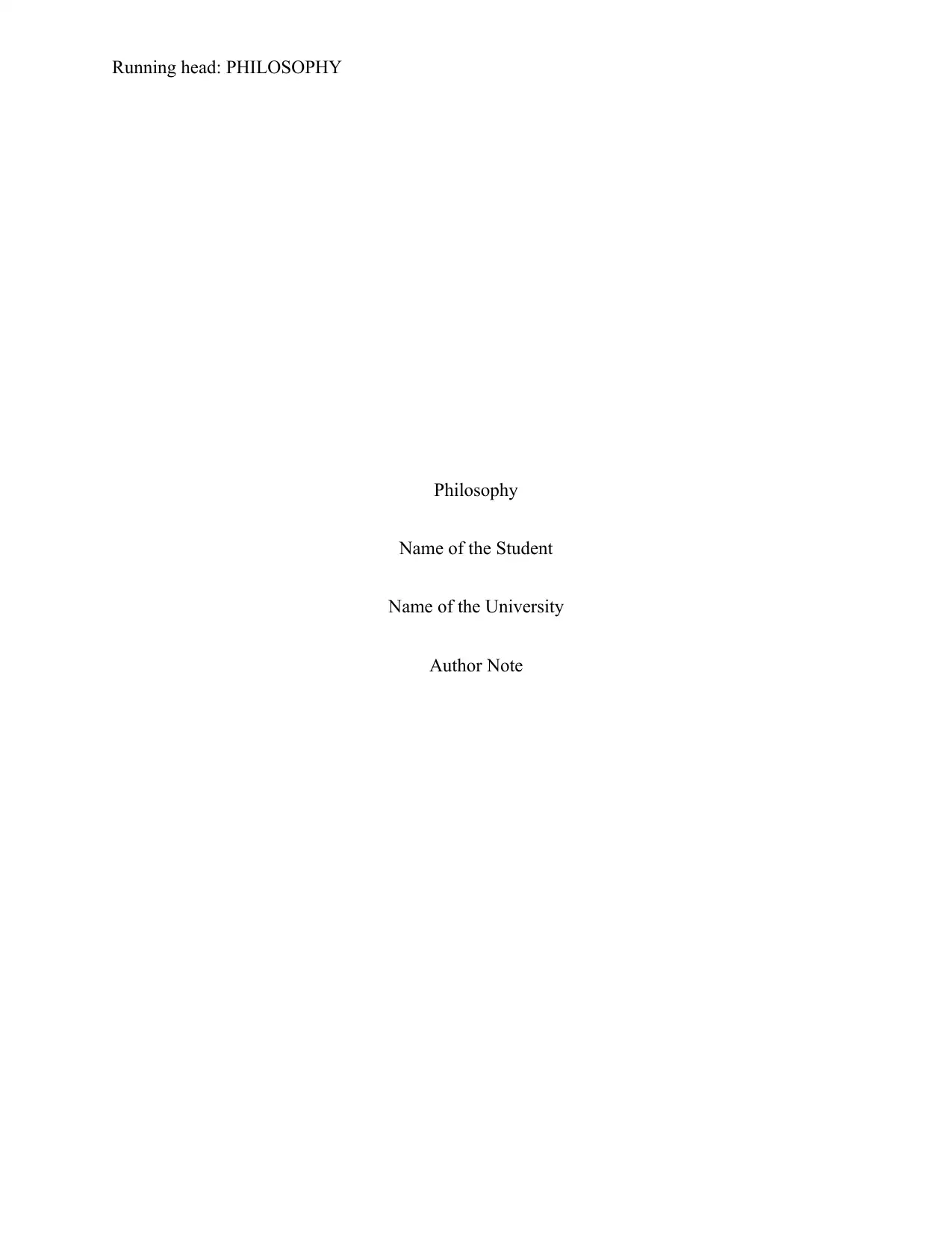
Running head: PHILOSOPHY
Philosophy
Name of the Student
Name of the University
Author Note
Philosophy
Name of the Student
Name of the University
Author Note
Secure Best Marks with AI Grader
Need help grading? Try our AI Grader for instant feedback on your assignments.
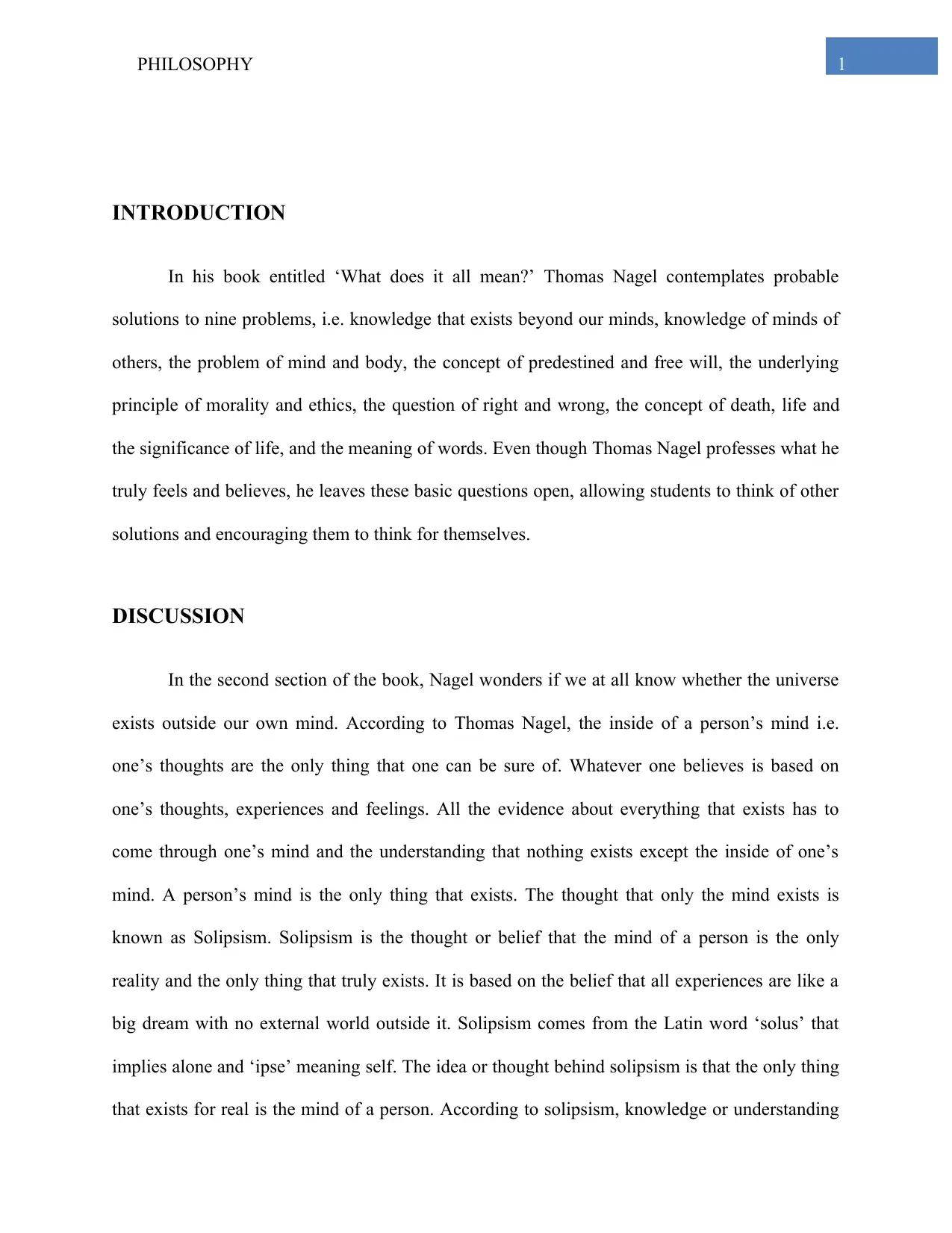
1PHILOSOPHY
INTRODUCTION
In his book entitled ‘What does it all mean?’ Thomas Nagel contemplates probable
solutions to nine problems, i.e. knowledge that exists beyond our minds, knowledge of minds of
others, the problem of mind and body, the concept of predestined and free will, the underlying
principle of morality and ethics, the question of right and wrong, the concept of death, life and
the significance of life, and the meaning of words. Even though Thomas Nagel professes what he
truly feels and believes, he leaves these basic questions open, allowing students to think of other
solutions and encouraging them to think for themselves.
DISCUSSION
In the second section of the book, Nagel wonders if we at all know whether the universe
exists outside our own mind. According to Thomas Nagel, the inside of a person’s mind i.e.
one’s thoughts are the only thing that one can be sure of. Whatever one believes is based on
one’s thoughts, experiences and feelings. All the evidence about everything that exists has to
come through one’s mind and the understanding that nothing exists except the inside of one’s
mind. A person’s mind is the only thing that exists. The thought that only the mind exists is
known as Solipsism. Solipsism is the thought or belief that the mind of a person is the only
reality and the only thing that truly exists. It is based on the belief that all experiences are like a
big dream with no external world outside it. Solipsism comes from the Latin word ‘solus’ that
implies alone and ‘ipse’ meaning self. The idea or thought behind solipsism is that the only thing
that exists for real is the mind of a person. According to solipsism, knowledge or understanding
INTRODUCTION
In his book entitled ‘What does it all mean?’ Thomas Nagel contemplates probable
solutions to nine problems, i.e. knowledge that exists beyond our minds, knowledge of minds of
others, the problem of mind and body, the concept of predestined and free will, the underlying
principle of morality and ethics, the question of right and wrong, the concept of death, life and
the significance of life, and the meaning of words. Even though Thomas Nagel professes what he
truly feels and believes, he leaves these basic questions open, allowing students to think of other
solutions and encouraging them to think for themselves.
DISCUSSION
In the second section of the book, Nagel wonders if we at all know whether the universe
exists outside our own mind. According to Thomas Nagel, the inside of a person’s mind i.e.
one’s thoughts are the only thing that one can be sure of. Whatever one believes is based on
one’s thoughts, experiences and feelings. All the evidence about everything that exists has to
come through one’s mind and the understanding that nothing exists except the inside of one’s
mind. A person’s mind is the only thing that exists. The thought that only the mind exists is
known as Solipsism. Solipsism is the thought or belief that the mind of a person is the only
reality and the only thing that truly exists. It is based on the belief that all experiences are like a
big dream with no external world outside it. Solipsism comes from the Latin word ‘solus’ that
implies alone and ‘ipse’ meaning self. The idea or thought behind solipsism is that the only thing
that exists for real is the mind of a person. According to solipsism, knowledge or understanding
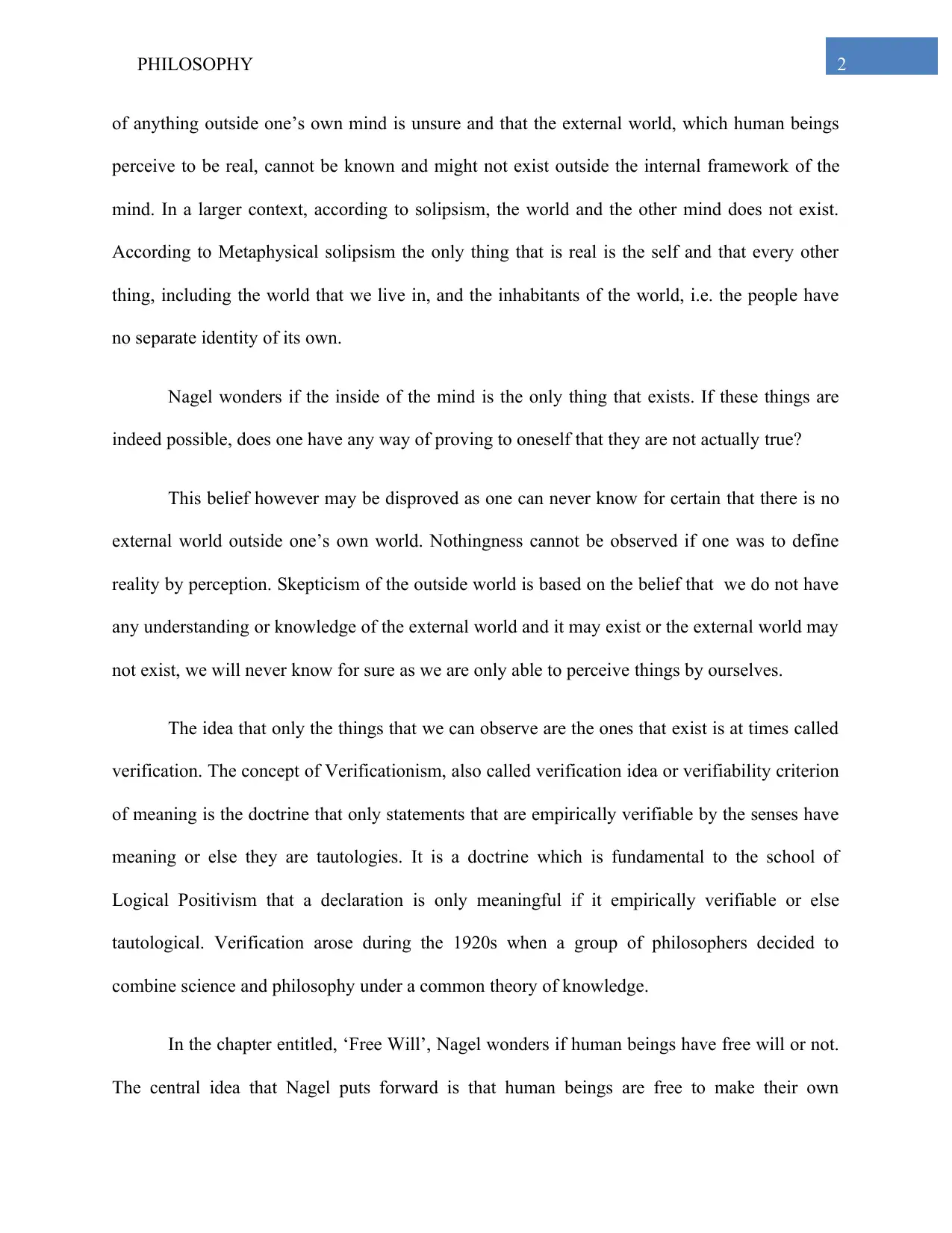
2PHILOSOPHY
of anything outside one’s own mind is unsure and that the external world, which human beings
perceive to be real, cannot be known and might not exist outside the internal framework of the
mind. In a larger context, according to solipsism, the world and the other mind does not exist.
According to Metaphysical solipsism the only thing that is real is the self and that every other
thing, including the world that we live in, and the inhabitants of the world, i.e. the people have
no separate identity of its own.
Nagel wonders if the inside of the mind is the only thing that exists. If these things are
indeed possible, does one have any way of proving to oneself that they are not actually true?
This belief however may be disproved as one can never know for certain that there is no
external world outside one’s own world. Nothingness cannot be observed if one was to define
reality by perception. Skepticism of the outside world is based on the belief that we do not have
any understanding or knowledge of the external world and it may exist or the external world may
not exist, we will never know for sure as we are only able to perceive things by ourselves.
The idea that only the things that we can observe are the ones that exist is at times called
verification. The concept of Verificationism, also called verification idea or verifiability criterion
of meaning is the doctrine that only statements that are empirically verifiable by the senses have
meaning or else they are tautologies. It is a doctrine which is fundamental to the school of
Logical Positivism that a declaration is only meaningful if it empirically verifiable or else
tautological. Verification arose during the 1920s when a group of philosophers decided to
combine science and philosophy under a common theory of knowledge.
In the chapter entitled, ‘Free Will’, Nagel wonders if human beings have free will or not.
The central idea that Nagel puts forward is that human beings are free to make their own
of anything outside one’s own mind is unsure and that the external world, which human beings
perceive to be real, cannot be known and might not exist outside the internal framework of the
mind. In a larger context, according to solipsism, the world and the other mind does not exist.
According to Metaphysical solipsism the only thing that is real is the self and that every other
thing, including the world that we live in, and the inhabitants of the world, i.e. the people have
no separate identity of its own.
Nagel wonders if the inside of the mind is the only thing that exists. If these things are
indeed possible, does one have any way of proving to oneself that they are not actually true?
This belief however may be disproved as one can never know for certain that there is no
external world outside one’s own world. Nothingness cannot be observed if one was to define
reality by perception. Skepticism of the outside world is based on the belief that we do not have
any understanding or knowledge of the external world and it may exist or the external world may
not exist, we will never know for sure as we are only able to perceive things by ourselves.
The idea that only the things that we can observe are the ones that exist is at times called
verification. The concept of Verificationism, also called verification idea or verifiability criterion
of meaning is the doctrine that only statements that are empirically verifiable by the senses have
meaning or else they are tautologies. It is a doctrine which is fundamental to the school of
Logical Positivism that a declaration is only meaningful if it empirically verifiable or else
tautological. Verification arose during the 1920s when a group of philosophers decided to
combine science and philosophy under a common theory of knowledge.
In the chapter entitled, ‘Free Will’, Nagel wonders if human beings have free will or not.
The central idea that Nagel puts forward is that human beings are free to make their own
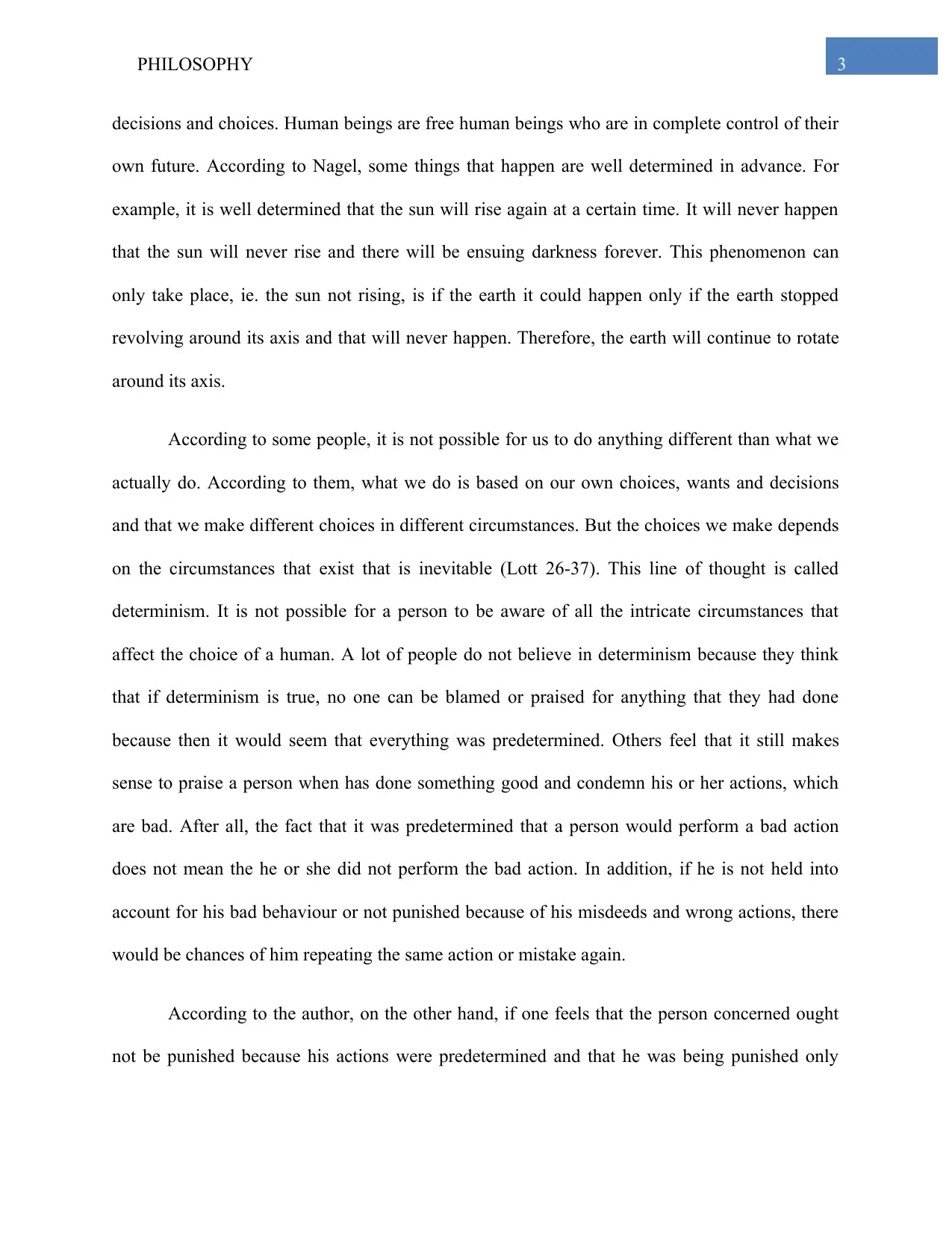
3PHILOSOPHY
decisions and choices. Human beings are free human beings who are in complete control of their
own future. According to Nagel, some things that happen are well determined in advance. For
example, it is well determined that the sun will rise again at a certain time. It will never happen
that the sun will never rise and there will be ensuing darkness forever. This phenomenon can
only take place, ie. the sun not rising, is if the earth it could happen only if the earth stopped
revolving around its axis and that will never happen. Therefore, the earth will continue to rotate
around its axis.
According to some people, it is not possible for us to do anything different than what we
actually do. According to them, what we do is based on our own choices, wants and decisions
and that we make different choices in different circumstances. But the choices we make depends
on the circumstances that exist that is inevitable (Lott 26-37). This line of thought is called
determinism. It is not possible for a person to be aware of all the intricate circumstances that
affect the choice of a human. A lot of people do not believe in determinism because they think
that if determinism is true, no one can be blamed or praised for anything that they had done
because then it would seem that everything was predetermined. Others feel that it still makes
sense to praise a person when has done something good and condemn his or her actions, which
are bad. After all, the fact that it was predetermined that a person would perform a bad action
does not mean the he or she did not perform the bad action. In addition, if he is not held into
account for his bad behaviour or not punished because of his misdeeds and wrong actions, there
would be chances of him repeating the same action or mistake again.
According to the author, on the other hand, if one feels that the person concerned ought
not be punished because his actions were predetermined and that he was being punished only
decisions and choices. Human beings are free human beings who are in complete control of their
own future. According to Nagel, some things that happen are well determined in advance. For
example, it is well determined that the sun will rise again at a certain time. It will never happen
that the sun will never rise and there will be ensuing darkness forever. This phenomenon can
only take place, ie. the sun not rising, is if the earth it could happen only if the earth stopped
revolving around its axis and that will never happen. Therefore, the earth will continue to rotate
around its axis.
According to some people, it is not possible for us to do anything different than what we
actually do. According to them, what we do is based on our own choices, wants and decisions
and that we make different choices in different circumstances. But the choices we make depends
on the circumstances that exist that is inevitable (Lott 26-37). This line of thought is called
determinism. It is not possible for a person to be aware of all the intricate circumstances that
affect the choice of a human. A lot of people do not believe in determinism because they think
that if determinism is true, no one can be blamed or praised for anything that they had done
because then it would seem that everything was predetermined. Others feel that it still makes
sense to praise a person when has done something good and condemn his or her actions, which
are bad. After all, the fact that it was predetermined that a person would perform a bad action
does not mean the he or she did not perform the bad action. In addition, if he is not held into
account for his bad behaviour or not punished because of his misdeeds and wrong actions, there
would be chances of him repeating the same action or mistake again.
According to the author, on the other hand, if one feels that the person concerned ought
not be punished because his actions were predetermined and that he was being punished only
Secure Best Marks with AI Grader
Need help grading? Try our AI Grader for instant feedback on your assignments.
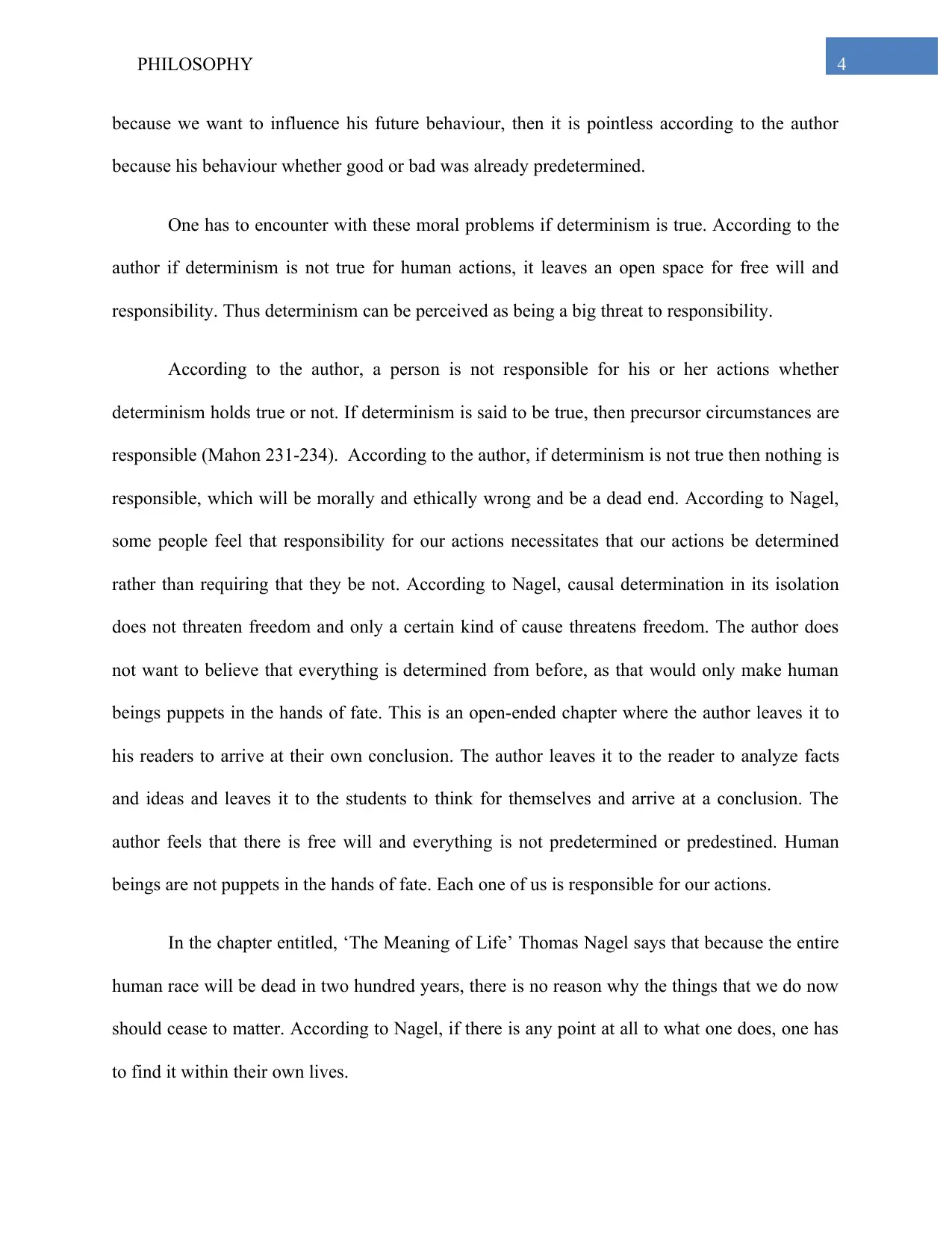
4PHILOSOPHY
because we want to influence his future behaviour, then it is pointless according to the author
because his behaviour whether good or bad was already predetermined.
One has to encounter with these moral problems if determinism is true. According to the
author if determinism is not true for human actions, it leaves an open space for free will and
responsibility. Thus determinism can be perceived as being a big threat to responsibility.
According to the author, a person is not responsible for his or her actions whether
determinism holds true or not. If determinism is said to be true, then precursor circumstances are
responsible (Mahon 231-234). According to the author, if determinism is not true then nothing is
responsible, which will be morally and ethically wrong and be a dead end. According to Nagel,
some people feel that responsibility for our actions necessitates that our actions be determined
rather than requiring that they be not. According to Nagel, causal determination in its isolation
does not threaten freedom and only a certain kind of cause threatens freedom. The author does
not want to believe that everything is determined from before, as that would only make human
beings puppets in the hands of fate. This is an open-ended chapter where the author leaves it to
his readers to arrive at their own conclusion. The author leaves it to the reader to analyze facts
and ideas and leaves it to the students to think for themselves and arrive at a conclusion. The
author feels that there is free will and everything is not predetermined or predestined. Human
beings are not puppets in the hands of fate. Each one of us is responsible for our actions.
In the chapter entitled, ‘The Meaning of Life’ Thomas Nagel says that because the entire
human race will be dead in two hundred years, there is no reason why the things that we do now
should cease to matter. According to Nagel, if there is any point at all to what one does, one has
to find it within their own lives.
because we want to influence his future behaviour, then it is pointless according to the author
because his behaviour whether good or bad was already predetermined.
One has to encounter with these moral problems if determinism is true. According to the
author if determinism is not true for human actions, it leaves an open space for free will and
responsibility. Thus determinism can be perceived as being a big threat to responsibility.
According to the author, a person is not responsible for his or her actions whether
determinism holds true or not. If determinism is said to be true, then precursor circumstances are
responsible (Mahon 231-234). According to the author, if determinism is not true then nothing is
responsible, which will be morally and ethically wrong and be a dead end. According to Nagel,
some people feel that responsibility for our actions necessitates that our actions be determined
rather than requiring that they be not. According to Nagel, causal determination in its isolation
does not threaten freedom and only a certain kind of cause threatens freedom. The author does
not want to believe that everything is determined from before, as that would only make human
beings puppets in the hands of fate. This is an open-ended chapter where the author leaves it to
his readers to arrive at their own conclusion. The author leaves it to the reader to analyze facts
and ideas and leaves it to the students to think for themselves and arrive at a conclusion. The
author feels that there is free will and everything is not predetermined or predestined. Human
beings are not puppets in the hands of fate. Each one of us is responsible for our actions.
In the chapter entitled, ‘The Meaning of Life’ Thomas Nagel says that because the entire
human race will be dead in two hundred years, there is no reason why the things that we do now
should cease to matter. According to Nagel, if there is any point at all to what one does, one has
to find it within their own lives.
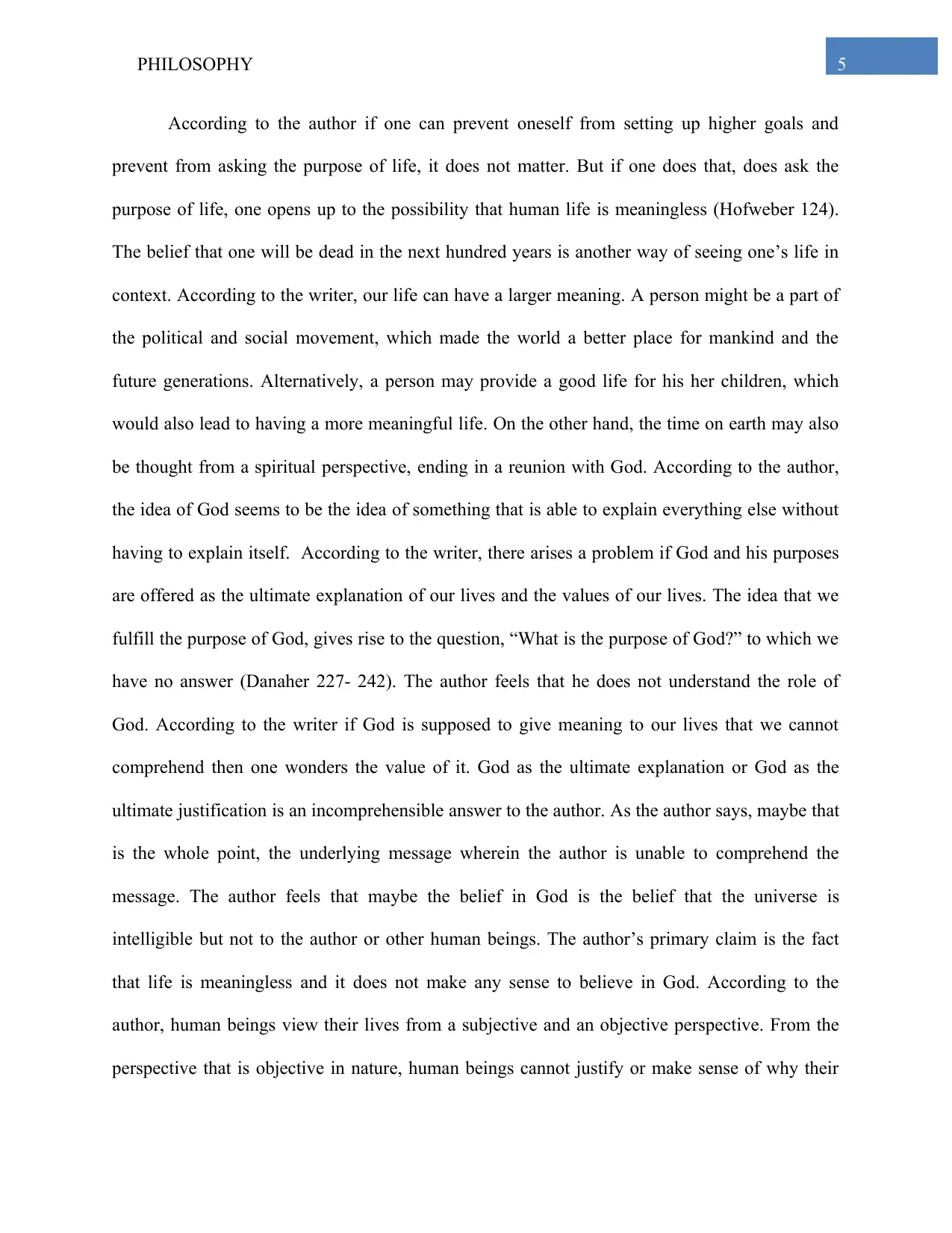
5PHILOSOPHY
According to the author if one can prevent oneself from setting up higher goals and
prevent from asking the purpose of life, it does not matter. But if one does that, does ask the
purpose of life, one opens up to the possibility that human life is meaningless (Hofweber 124).
The belief that one will be dead in the next hundred years is another way of seeing one’s life in
context. According to the writer, our life can have a larger meaning. A person might be a part of
the political and social movement, which made the world a better place for mankind and the
future generations. Alternatively, a person may provide a good life for his her children, which
would also lead to having a more meaningful life. On the other hand, the time on earth may also
be thought from a spiritual perspective, ending in a reunion with God. According to the author,
the idea of God seems to be the idea of something that is able to explain everything else without
having to explain itself. According to the writer, there arises a problem if God and his purposes
are offered as the ultimate explanation of our lives and the values of our lives. The idea that we
fulfill the purpose of God, gives rise to the question, “What is the purpose of God?” to which we
have no answer (Danaher 227- 242). The author feels that he does not understand the role of
God. According to the writer if God is supposed to give meaning to our lives that we cannot
comprehend then one wonders the value of it. God as the ultimate explanation or God as the
ultimate justification is an incomprehensible answer to the author. As the author says, maybe that
is the whole point, the underlying message wherein the author is unable to comprehend the
message. The author feels that maybe the belief in God is the belief that the universe is
intelligible but not to the author or other human beings. The author’s primary claim is the fact
that life is meaningless and it does not make any sense to believe in God. According to the
author, human beings view their lives from a subjective and an objective perspective. From the
perspective that is objective in nature, human beings cannot justify or make sense of why their
According to the author if one can prevent oneself from setting up higher goals and
prevent from asking the purpose of life, it does not matter. But if one does that, does ask the
purpose of life, one opens up to the possibility that human life is meaningless (Hofweber 124).
The belief that one will be dead in the next hundred years is another way of seeing one’s life in
context. According to the writer, our life can have a larger meaning. A person might be a part of
the political and social movement, which made the world a better place for mankind and the
future generations. Alternatively, a person may provide a good life for his her children, which
would also lead to having a more meaningful life. On the other hand, the time on earth may also
be thought from a spiritual perspective, ending in a reunion with God. According to the author,
the idea of God seems to be the idea of something that is able to explain everything else without
having to explain itself. According to the writer, there arises a problem if God and his purposes
are offered as the ultimate explanation of our lives and the values of our lives. The idea that we
fulfill the purpose of God, gives rise to the question, “What is the purpose of God?” to which we
have no answer (Danaher 227- 242). The author feels that he does not understand the role of
God. According to the writer if God is supposed to give meaning to our lives that we cannot
comprehend then one wonders the value of it. God as the ultimate explanation or God as the
ultimate justification is an incomprehensible answer to the author. As the author says, maybe that
is the whole point, the underlying message wherein the author is unable to comprehend the
message. The author feels that maybe the belief in God is the belief that the universe is
intelligible but not to the author or other human beings. The author’s primary claim is the fact
that life is meaningless and it does not make any sense to believe in God. According to the
author, human beings view their lives from a subjective and an objective perspective. From the
perspective that is objective in nature, human beings cannot justify or make sense of why their
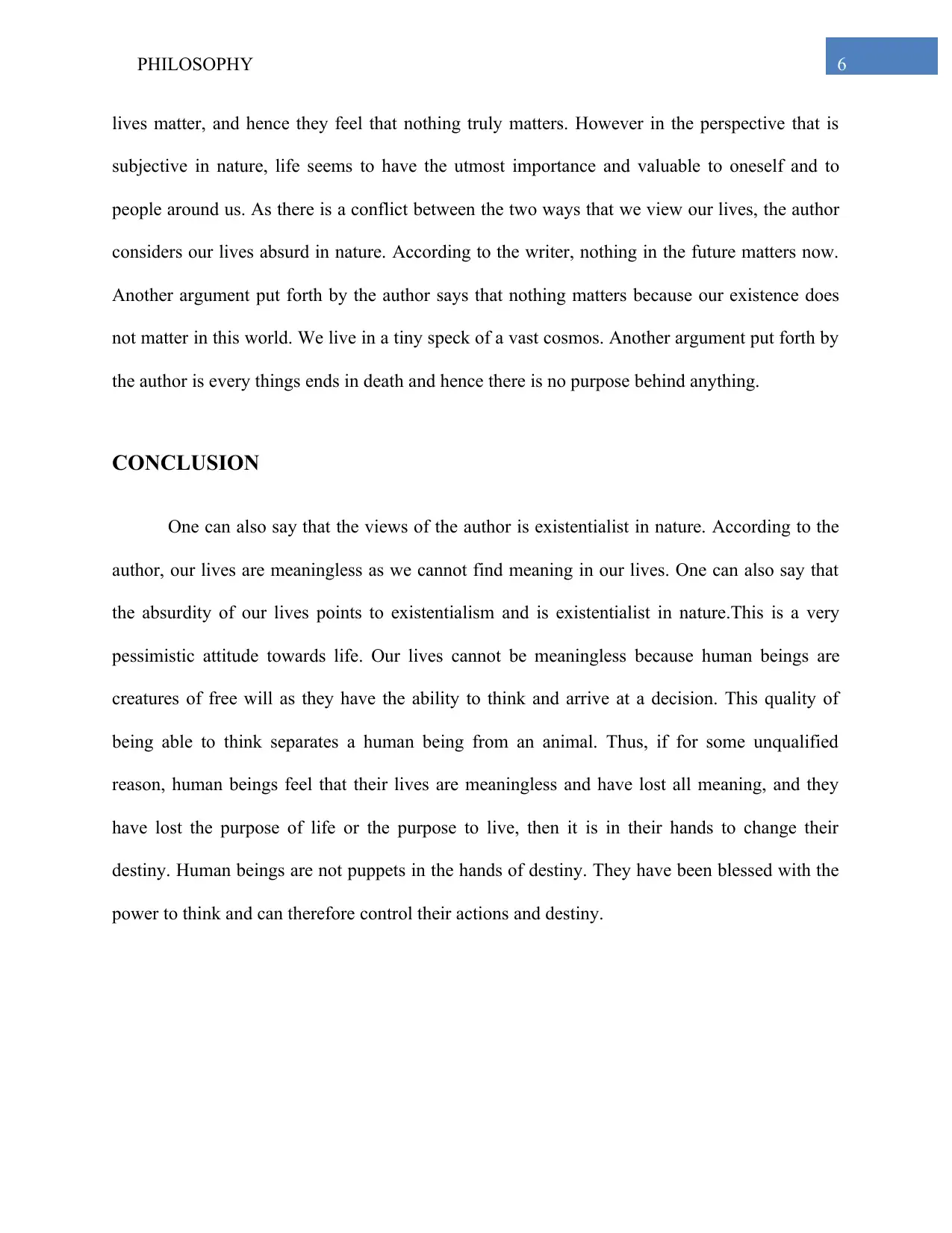
6PHILOSOPHY
lives matter, and hence they feel that nothing truly matters. However in the perspective that is
subjective in nature, life seems to have the utmost importance and valuable to oneself and to
people around us. As there is a conflict between the two ways that we view our lives, the author
considers our lives absurd in nature. According to the writer, nothing in the future matters now.
Another argument put forth by the author says that nothing matters because our existence does
not matter in this world. We live in a tiny speck of a vast cosmos. Another argument put forth by
the author is every things ends in death and hence there is no purpose behind anything.
CONCLUSION
One can also say that the views of the author is existentialist in nature. According to the
author, our lives are meaningless as we cannot find meaning in our lives. One can also say that
the absurdity of our lives points to existentialism and is existentialist in nature.This is a very
pessimistic attitude towards life. Our lives cannot be meaningless because human beings are
creatures of free will as they have the ability to think and arrive at a decision. This quality of
being able to think separates a human being from an animal. Thus, if for some unqualified
reason, human beings feel that their lives are meaningless and have lost all meaning, and they
have lost the purpose of life or the purpose to live, then it is in their hands to change their
destiny. Human beings are not puppets in the hands of destiny. They have been blessed with the
power to think and can therefore control their actions and destiny.
lives matter, and hence they feel that nothing truly matters. However in the perspective that is
subjective in nature, life seems to have the utmost importance and valuable to oneself and to
people around us. As there is a conflict between the two ways that we view our lives, the author
considers our lives absurd in nature. According to the writer, nothing in the future matters now.
Another argument put forth by the author says that nothing matters because our existence does
not matter in this world. We live in a tiny speck of a vast cosmos. Another argument put forth by
the author is every things ends in death and hence there is no purpose behind anything.
CONCLUSION
One can also say that the views of the author is existentialist in nature. According to the
author, our lives are meaningless as we cannot find meaning in our lives. One can also say that
the absurdity of our lives points to existentialism and is existentialist in nature.This is a very
pessimistic attitude towards life. Our lives cannot be meaningless because human beings are
creatures of free will as they have the ability to think and arrive at a decision. This quality of
being able to think separates a human being from an animal. Thus, if for some unqualified
reason, human beings feel that their lives are meaningless and have lost all meaning, and they
have lost the purpose of life or the purpose to live, then it is in their hands to change their
destiny. Human beings are not puppets in the hands of destiny. They have been blessed with the
power to think and can therefore control their actions and destiny.
Paraphrase This Document
Need a fresh take? Get an instant paraphrase of this document with our AI Paraphraser
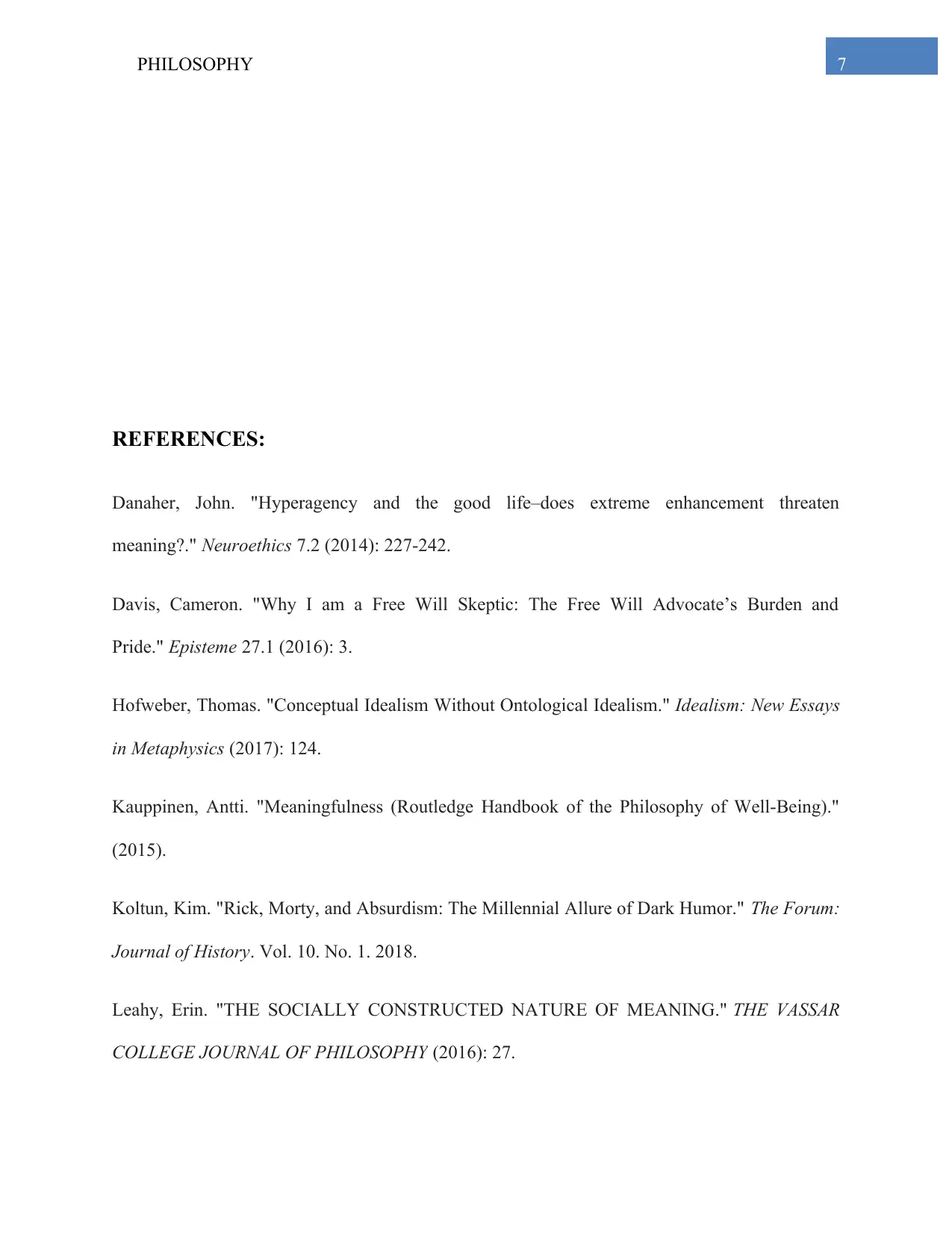
7PHILOSOPHY
REFERENCES:
Danaher, John. "Hyperagency and the good life–does extreme enhancement threaten
meaning?." Neuroethics 7.2 (2014): 227-242.
Davis, Cameron. "Why I am a Free Will Skeptic: The Free Will Advocate’s Burden and
Pride." Episteme 27.1 (2016): 3.
Hofweber, Thomas. "Conceptual Idealism Without Ontological Idealism." Idealism: New Essays
in Metaphysics (2017): 124.
Kauppinen, Antti. "Meaningfulness (Routledge Handbook of the Philosophy of Well-Being)."
(2015).
Koltun, Kim. "Rick, Morty, and Absurdism: The Millennial Allure of Dark Humor." The Forum:
Journal of History. Vol. 10. No. 1. 2018.
Leahy, Erin. "THE SOCIALLY CONSTRUCTED NATURE OF MEANING." THE VASSAR
COLLEGE JOURNAL OF PHILOSOPHY (2016): 27.
REFERENCES:
Danaher, John. "Hyperagency and the good life–does extreme enhancement threaten
meaning?." Neuroethics 7.2 (2014): 227-242.
Davis, Cameron. "Why I am a Free Will Skeptic: The Free Will Advocate’s Burden and
Pride." Episteme 27.1 (2016): 3.
Hofweber, Thomas. "Conceptual Idealism Without Ontological Idealism." Idealism: New Essays
in Metaphysics (2017): 124.
Kauppinen, Antti. "Meaningfulness (Routledge Handbook of the Philosophy of Well-Being)."
(2015).
Koltun, Kim. "Rick, Morty, and Absurdism: The Millennial Allure of Dark Humor." The Forum:
Journal of History. Vol. 10. No. 1. 2018.
Leahy, Erin. "THE SOCIALLY CONSTRUCTED NATURE OF MEANING." THE VASSAR
COLLEGE JOURNAL OF PHILOSOPHY (2016): 27.
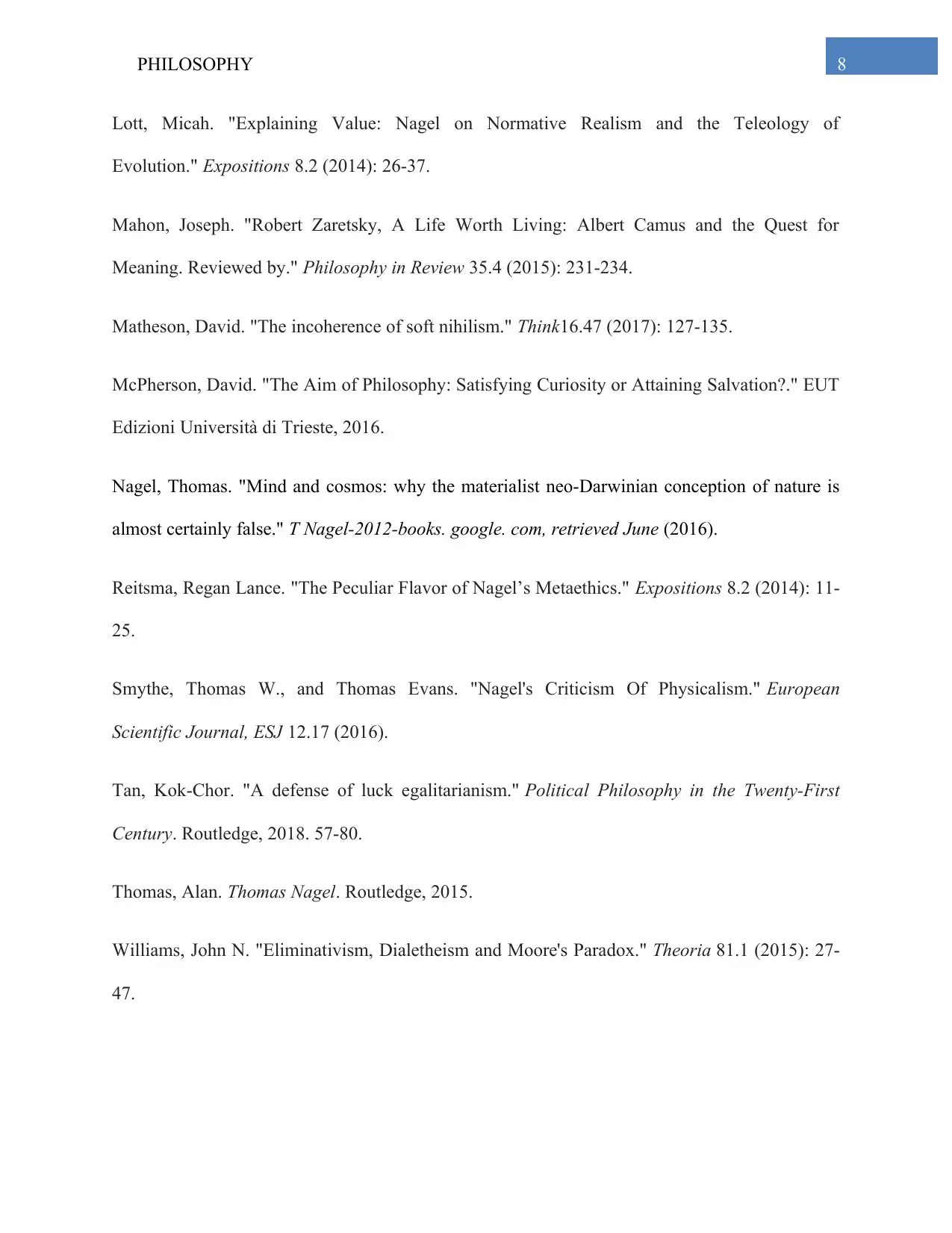
8PHILOSOPHY
Lott, Micah. "Explaining Value: Nagel on Normative Realism and the Teleology of
Evolution." Expositions 8.2 (2014): 26-37.
Mahon, Joseph. "Robert Zaretsky, A Life Worth Living: Albert Camus and the Quest for
Meaning. Reviewed by." Philosophy in Review 35.4 (2015): 231-234.
Matheson, David. "The incoherence of soft nihilism." Think16.47 (2017): 127-135.
McPherson, David. "The Aim of Philosophy: Satisfying Curiosity or Attaining Salvation?." EUT
Edizioni Università di Trieste, 2016.
Nagel, Thomas. "Mind and cosmos: why the materialist neo-Darwinian conception of nature is
almost certainly false." T Nagel-2012-books. google. com, retrieved June (2016).
Reitsma, Regan Lance. "The Peculiar Flavor of Nagel’s Metaethics." Expositions 8.2 (2014): 11-
25.
Smythe, Thomas W., and Thomas Evans. "Nagel's Criticism Of Physicalism." European
Scientific Journal, ESJ 12.17 (2016).
Tan, Kok-Chor. "A defense of luck egalitarianism." Political Philosophy in the Twenty-First
Century. Routledge, 2018. 57-80.
Thomas, Alan. Thomas Nagel. Routledge, 2015.
Williams, John N. "Eliminativism, Dialetheism and Moore's Paradox." Theoria 81.1 (2015): 27-
47.
Lott, Micah. "Explaining Value: Nagel on Normative Realism and the Teleology of
Evolution." Expositions 8.2 (2014): 26-37.
Mahon, Joseph. "Robert Zaretsky, A Life Worth Living: Albert Camus and the Quest for
Meaning. Reviewed by." Philosophy in Review 35.4 (2015): 231-234.
Matheson, David. "The incoherence of soft nihilism." Think16.47 (2017): 127-135.
McPherson, David. "The Aim of Philosophy: Satisfying Curiosity or Attaining Salvation?." EUT
Edizioni Università di Trieste, 2016.
Nagel, Thomas. "Mind and cosmos: why the materialist neo-Darwinian conception of nature is
almost certainly false." T Nagel-2012-books. google. com, retrieved June (2016).
Reitsma, Regan Lance. "The Peculiar Flavor of Nagel’s Metaethics." Expositions 8.2 (2014): 11-
25.
Smythe, Thomas W., and Thomas Evans. "Nagel's Criticism Of Physicalism." European
Scientific Journal, ESJ 12.17 (2016).
Tan, Kok-Chor. "A defense of luck egalitarianism." Political Philosophy in the Twenty-First
Century. Routledge, 2018. 57-80.
Thomas, Alan. Thomas Nagel. Routledge, 2015.
Williams, John N. "Eliminativism, Dialetheism and Moore's Paradox." Theoria 81.1 (2015): 27-
47.
1 out of 9
Related Documents
Your All-in-One AI-Powered Toolkit for Academic Success.
+13062052269
info@desklib.com
Available 24*7 on WhatsApp / Email
![[object Object]](/_next/static/media/star-bottom.7253800d.svg)
Unlock your academic potential
© 2024 | Zucol Services PVT LTD | All rights reserved.





